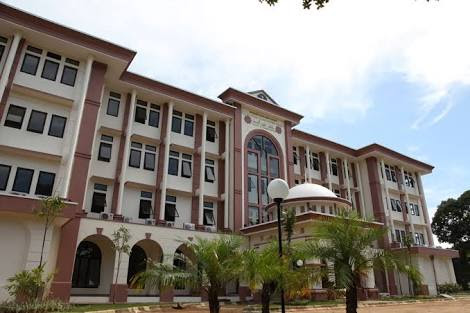THE VALIDITY OF E-MODULE TEACHING MATERIALS IN APPLIED MATHEMATICS COURSES
VALIDITAS BAHAN AJAR E-MODUL PADA MATA KULIAH MATEMATIKA TERAPAN
Abstract
This research is a type of research and development that aims to determine the validity of e-module teaching materials in applied mathematics courses for students. This research includes referring to the 4D development model which consists of several phases, namely the stages of defining, designing, developing, and disseminating. The product developed is in the form of e-module teaching materials in applied mathematics courses. The test subjects in this study were graphic engineering students at the State Polytechnic of Creative Media Makassar. The instrument used in this study was a validation sheet consisting of two validators from design experts and materials experts. Based on the results of the research that has been done, an analysis of the validation results: (1) graphic validity, namely 4.7 is in the very valid category; (2) language validity, which is 4.9, is in the very valid category; (3) construct validity is 4.9 is in the very valid category; and (4) e-module presentation that is 4.7, is in the very valid category so that the average value of all aspects is 4.8 which is in the very valid category. So that it can mean that the e-module teaching materials in applied mathematics courses that have been developed are declared valid to be used as teaching materials in the learning process.
Downloads
References
Ainun, A. M. (2019). Development of teaching materials assisted by maple software in the calculus I course for students majoring in mathematics education, Faculty of Tarbiyah, and Teacher Training. [Skripsi]. UIN Alauddin Makassar.
Akbar, S. (2013). Learning device instrument. Bandung: PT Remaja Rosdakarya.
Aprianka, S., Setiani, A., & Imswatama, A. (2021). Validity of e-modules based on open-ended meterial systems of linear equations in two variables in online learning for vocational school students. Journal Cendekia : Jurnal Pendidikan Matematika, 5(3), 3111–3122. https://doi.org/10.31004/cendekia.v5i3.896.
Daryanto. (2013). Preparing modules (Teaching materials for teacher preparation in teaching). Yogyakarta: Gava Media.
Halik, F., Acfira, L., & Tawaddud, B. (2022). Development of problem-based learning module in basic statistics for makassar graphic engineering students. https://doi.org/10.4108/eai.16-11-2022.2326148.
Halik, F., Acfira, L., & Tawaddud, B. (2022). The validity of problem-based learning teaching material for teaching basic statistics to graphics engineering students. MaPan: Jurnal Matematika dan Pembelajaran, 10(2), 207–218. https://doi.org/https://doi.org/10.24252/mapan.2022v10n2a2.
Hidayat, R., & Abdillah. (2019). Education science. Medan: LPPPI.
Islahiyah, I., Pujiastuti, H., & Mutaqin, A. (2021). Development of e-modules with a problem-based learning model to improve students' mathematical problem-solving abilities. AKSIOMA: Journal of the Mathematics Education Study Program, 10(4), 2107. https://doi.org/10.24127/ajpm.v10i4.3908.
Laman, E. G., & Halik, F. (2023). Analysis of students’ errors in solving higher-order thinking skills mathematical problems of geometry based on hadar criteria viewed from prior knowledge. MaPan: Jurnal Matematika dan Pembelajaran, 11(1), 186–201. https://doi.org/10.24252/mapan.2023v11n1a12.
Larkin, K., & Calder, N. (2016). Mathematics education and mobile technologies. Math Education, December 2015, 1–7. https://doi.org/10.1007/s13394-015-0167-6.
Lestari, & Surya. (2017). The Effectiveness of realistic mathematics education approach on ability of students’ mathematical concept understanding. International Journal of Sciences, 34(1), 91–100.
Madjijd, A. (2013). Learning strategies. Bandung: PT Remaja Rosdakarya.
Prastowo. (2011). Creative guide to creating innovative teaching materials. Yogyakarta: Diva Press.
Purnomo, D. (2011). Development of mathematics teaching materials as a means of developing creative thinking. AKSIOMA : Journal of the Mathematics Education Study Program, 2(1), 1. https://doi.org/10.26877/aks.v2i1/Maret.43.
Ramadhani, R., & Fitri, Y. (2020). Validity of EPUB3 Based Mathematics E-Modules Using Rasch Model Analysis. Journal Gantang, 5(2), 95–111. https://doi.org/10.31629/jg.v5i2.2535.
Sari, P., & Gautama, M. I. (2022). Failure factors in learning media development sociology teacher at SMAN 15 Padang. Naradidik: Journal of Education and Pedagogy, 1(1), 78–83. https://doi.org/10.24036/nara.v1i1.8.
Sitepu. (2015). Writing textbooks. Bandung: PT Remaja Rosdakarya.
Suarsana, & Mahayukti. (2013). Development of problem-solving oriented e-modules to improve students' critical thinking skills. Indonesian Education Journal, 2(2), 264–275.
Sudjana, N. (2009). Assessment of teaching and learning process results. Bandung: Remaja Rosdakasya.
Sugiyono. (2009). Educational research methods (quantitative, qualitative, and R&D). Bandung: Alfabeta.
Turnip, R. F., & Karyono, H. (2021). Development of mathematics e-modules to improve critical thinking skills. Journal of Mathematics and Science Education, 9(2), 485–498. https://doi.org/10.25273/jems.v9i2.11057.
Yakub, R. D. (2019). Development of context-based mathematics learning tools on systems of linear equations in two variables class VIII MTs. [Skripsi]. UIN Alauddin Makassar.
Copyright (c) 2023 Fitriani Halik, Bonitalia, Suardi, Nur Saiful, Najmawati Sulaiman

This work is licensed under a Creative Commons Attribution 4.0 International License.

